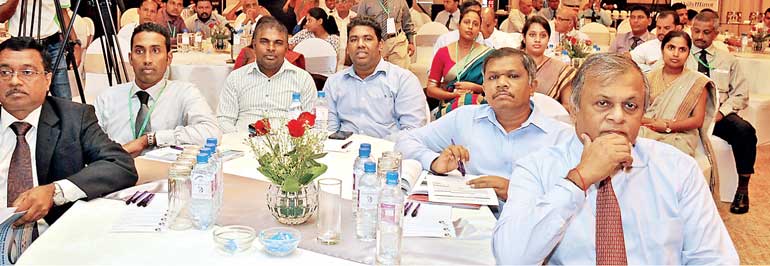Tuesday Feb 17, 2026
Tuesday Feb 17, 2026
Thursday, 28 July 2016 00:02 - - {{hitsCtrl.values.hits}}
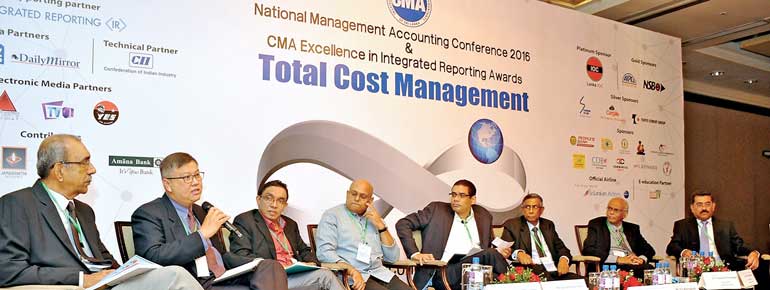
By Charumini de Silva
Despite being burdened by weak macroeconomic policies, the Sri Lankan economy could be rejuvenated by implementing Total Cost Management (TCM) structures across its vital segments, such as the public sector, and by strengthening the flow of investment into 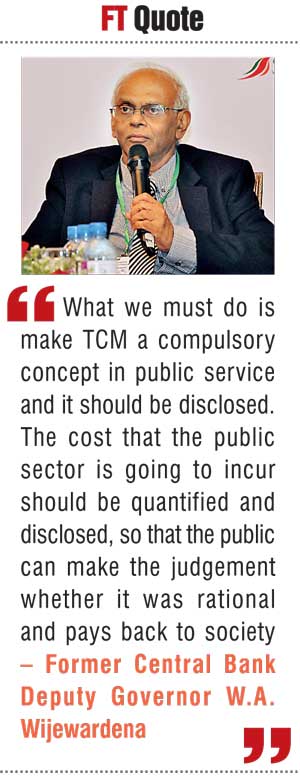 the country to foster growth, top experts said during the CMA National Management Accounting Conference.
the country to foster growth, top experts said during the CMA National Management Accounting Conference.
Moderated by National Policies and Economic Affairs Ministry Advisor and National Human Resource Development Council of Sri Lanka Chairman Dinesh Weerakkody, the first session of the CMA National Management Accounting Conference 2016 on ‘Total Cost Management (TCM) and Economic Development’included a panel discussion featuring National University of Singapore Accounting Department Head Prof. Ho Yew Kee, Central Bank Deputy Governor Dr. Nandalal Weerasinghe, University of Colombo Professor of Economics Prof. Sirimal Abeyratne, Former Central Bank Deputy Governor W.A. Wijewardena and Ceylon Chamber of Commerce Immediate Past Chairman Suresh Shah. The question and answer session, which includes queries from the audience, is provided below.
Competitiveness and services
In response to whether Sri Lankans should pay for services, Prof. Abeyratne noted that the missed opportunities of Sri Lanka during the last many decades resulted in less foreign investment.
“I don’t think the late Prime Minister of Singapore Lee Kuan Yew wanted to follow Sri Lanka as an example but he made sure that Singapore would not follow anything that we have followed here. The extension welfare system is a major problem we have developed in this country. Although we have political commitment and the will to do certain things in this democratic system, it is important to have strategies in place to implement them and this is the Government’s struggle despite knowing the problem. In democracy, the will of the majority may not be the right decision. Therefore we need to manage our costs and wasteful expenditure and that is one of the key concerns that we need to correct if we want to follow policies in the right direction,” he said.
Shah opined that even the private sector had to pay for the government services it received. Fundamentally, the Sri Lankan private sector, because it is small, needs competition from outside. Sri Lankan companies need to be able to compete in markets other than those in Sri Lanka.
“That’s the only way forward for a country like Sri Lanka. When you look at it from that perspective, the Sri Lankan private sector needs to say that we need to get not just the similar facilities that other businesses in other countries enjoy but we also need to get the same level of policy consistency like in other countries.
“Now the lack of consistency at the local level affects the private sector more than the cost of electricity for example. If we are to compete with entities outside of Sri Lanka then the operating environments must also be conducive in a way similar to those markets overseas. If not, we have immediate constraints. It is not so much about the cost of a service but more importantly the policy framework should be level with those markets we need to face overseas.”
Sri Lanka’s revenue for 2016 has been forecast as Rs. 1.5 trillion but expenditure is Rs. 2.2 trillion. Along with this the country has a budget deficit close to Rs. 650 billion. The panellists were asked whether Total Cost Management could be used to reduce a few of these expenses.
Dr. Weerasinghe noted that the TCM concept was essentially accounting terminology but economists call it the Total Factor Productivity (TFP) in economics. Cost management means one basically produces an output at a similar cost or at a lower cost with similar output or higher output. In economic terms TFP is in terms of labour, capital or technology. This applies throughout organisations and 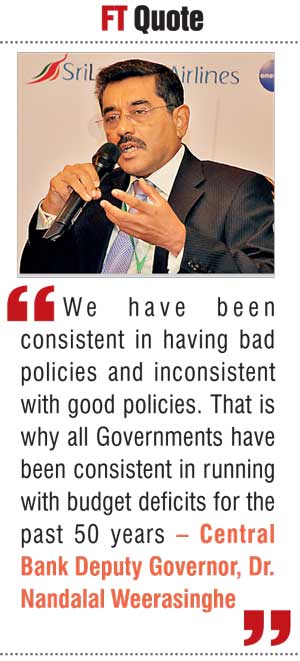 governments.
governments.
“If you look at countries that have grown fast, a key growth driver was TFP, which in your terminology is TCM. If a country cannot improve the TFP then it will stagnate and then you continuously increase your labour or capital which is a limited resource. From a Government point of view, if you look at the labour the number of people who have been recruited to the public service has been increased from 600,000 to 1.5 million.”
“The question is whether the public have got value for money which they spend on the services provided by them. This clearly tells us that TFP in the government services has been negative. If you look at the number of inputs, with capital too if you look at the past seven years, the Government has been spending capital on roads, expressways and infrastructure, but that’s where the capital and labour have been utilised, but that has not gotten the desired output on a competitive basis.”
Dr. Weerasinghe went on to say that his assessment was on overall Government expenditure on labour and capital. In this regard, if TCM was applied, the same projects would have been done at a much lower cost.
“I agree with Prof. Abeyratne’s comments on stop-go policies. We have been consistent in having bad policies and inconsistent with good policies. That is why all Governments have been consistent in running with budget deficits for the past 50 years. That is bad policy; you spend more than what you earn.”
If Sri Lanka has any chance of reducing debt Dr. Weerasinghe insisted that the Government had to find ways to finance the budget deficit by implementing good macroeconomic fundamentals.
“In the medium to long term we need to bring down the necessary financing. That is why the Government is now committed to bringing down the budget deficit to 5.4% this year and 3.5% by 2020. Sri Lanka is one of the only countries I know that has been running on a budget deficit of 6%-10% for 40 years consistently.”
Raising productivity
Before implementing TCM, Sri Lanka has to streamline its systems. Just the simple example of multiple days used to hold elections was given as an example of wasted resources by Shah.
“My recommendation here would be to have all four elections on one day. At least then you can get the reforms done under a five-year period and you will move forward. The other thing at Government level, you cannot separate politics from economics. It’s a political economy and always there is a trade-off between politics and economics. The major difference we see between those East Asian economies and us is that those nations, when the trade-off happens, they trade off more on the side of economics than on the side of politics. But in Sri Lanka unfortunately the trade-off has always been on the side of politics rather than on the side of economics, which is why we have this real ‘entitlement culture’.”
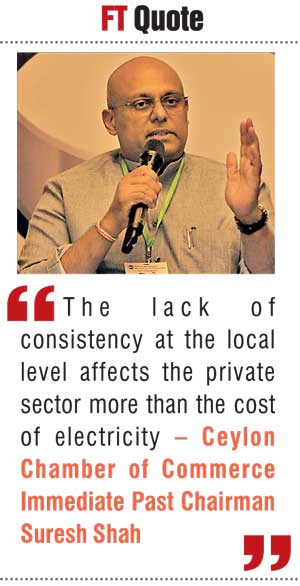 The majority of Sri Lankans who work overseas have done brilliantly but those same Sri Lankans in this environment for some reason don’t seem to perform, observed Shah.
The majority of Sri Lankans who work overseas have done brilliantly but those same Sri Lankans in this environment for some reason don’t seem to perform, observed Shah.
“I really don’t understand where the problem really stems from. Is it the education system? If that is the case, how do these people go overseas and compete in a much more competitive environment and do well? Whether this goes back to this whole entitlement culture, sitting back and waiting until things are given to us, whereas when you go overseas it is a different ball game. I don’t think Sri Lankans lack competitiveness, but again it boils down to the environment that we are in and because of that we tend to behave in a way which is not the most productive.”
Commenting on the option of having elections on one day, Prof.Kee acknowledged that it would be difficult to achieve in a democracy and noted that the single party system in Singapore was a “privilege”.
“The Government of Sri Lanka has a hard challenge ahead, but the good news is that every citizen wants a good future. So the Government can convince the people that they are working for a good future for the entire nation. I think then the people will understand because at the end of the day what they are creating is for society. If you just stay as you are, the world will pass you by like what happened during the past 50 years. I believe that maybe lengthening the political system for five years will allow the Government to plan, implement, supervise and then go for an election allowing people to decide upon a better Government.”
Q: A fluctuating exchange rate is difficult for the private sector. What are your views?
Dr. Weerasinghe: There is no country in the world where you can maintain a stable currency. The exchange rate is one of the instruments that the Central Bank can use to stabilise growth and inflation and to stabilise growth and inflation you have the exchange rate and interest rate.
This is how the economy can maintain sustainable long-term growth. If you try to fix the exchange rate and interest rate it will affect growth and inflation, which is good for no one. That’s why people need to understand that there are ways to deal with a volatile currency but there is no way you can maintain it at a fixed level.
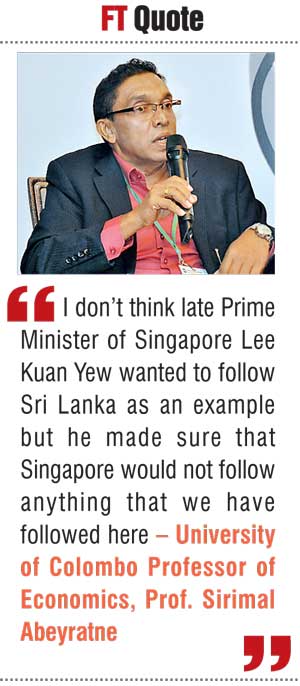 Q: Prof. Abeyratne said the state should not do business but in Singapore many of the large institutes are owned by the Government and they are run efficiently. At the Sri Lanka Ports Authority (SLPA) there are 10,000 people managing the port work as oppose to 500 people in Singapore generating more income. How do you make the SOEs profitable? What is the secret?
Q: Prof. Abeyratne said the state should not do business but in Singapore many of the large institutes are owned by the Government and they are run efficiently. At the Sri Lanka Ports Authority (SLPA) there are 10,000 people managing the port work as oppose to 500 people in Singapore generating more income. How do you make the SOEs profitable? What is the secret?
Prof. Kee: I think it is a very challenging question but you are absolutely right. In Singapore many of the organisations are SOEs such as the airline, telecom and even our utilities. I think we basically went on fundamental economic principles. We actually leave it to the market forces to run businesses.
At the beginning of our nation those were the vital supply lines we secured. Then the next question is how do we make it more efficient and effective? The challenge here is bringing in necessary manpower; this means they are not necessarily run by civil servants but we hire from the market and repopulate the senior management strata. And when the time comes, the Government lists it on the stock exchange while holding a substantial stake; thereby it compels them to compete for the best talent, best cost of borrowing and productivity.
Recruitment is on merit and we pay private sector salaries. It’s a very subtle transformation. Don’t forget that along the way the cost that the community has to pay is a little bit more expensive and the subsidies will no longer be there. At the end of the day they have to pay the market price for it.
Q: How do you set economic policy in Singapore?
Prof. Kee: Again we are very fortunate in that sense. I have to commend the fact that our politicians are very well paid for obvious reasons. One is that we want to attract the best people into politics. We hardly have any career politicians. Most of them were industrial people at some point. When they have made a name for themselves or proven themselves, the Government invites them to join politics. So politics then no longer becomes their bread and butter and they are there primarily because of their contribution back to the nation.
The other reason why we pay them reasonably is to eliminate their temptation for corruption because once politicians have to struggle for bread and butter then there is always temptation for corruption. Once you attract reasonable people from the top and work with the best civil servants you have, then you systematically craft economic policy.
In Singapore economic policies are always forward-looking, with them being 20-30 years ahead of our time. I think Lee Kuan Yew left us a wonderful legacy that is a system that must always out-lead us, which means economic policies and systems must out-lead us. We do not merely plan for my generation or my time, but we plan for the next generation.
Q: Will our generation ever hire the best people to the public sector?
Suresh: I think we have no choice. If we are talking about the right kind of policy framework, building a competitive productive economy, we need to attract the best people to the public service not just at the political level but from public servant level. Unless we pay competitive wages for the public service and for politicians we are not going to attract the right people. Everyone in this audience will accept that organisations at the end of the day are what their people bring to their organisations. If our systems are such that we are going to attract poor people into the public sector and also at the political level, then output is also going to be 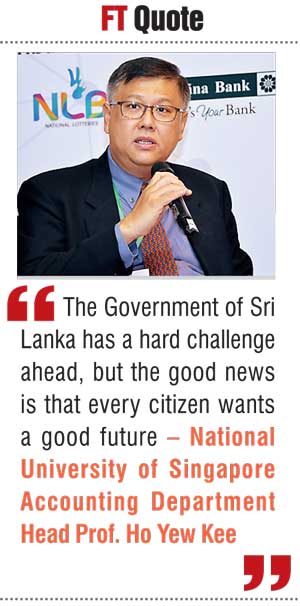 similar.
similar.
Q: Our civil service per capita is the highest in this part of the world. How do you see it?
Wijewardena: We have to pay market-based competitive salaries in the public sector but to do that we have to reduce the number of people, while recruiting the best people, training them and giving them opportunities so that they will be able to provide the best services to the institutions they are working for. Then only can we pay a higher salary for those people. Otherwise what will happen to us with these 1.5 million public servants even to increase their salaries by even Rs. 100 means we would have a tremendous cost increased in the total budget of the country.
What matters is that with all that we are not looking at this TCM, which is a timely theme selected by CMA Sri Lanka. The late Singaporean Prime Minister Lee Kuan Yew has very famously said that “if you pay peanuts, you get monkeys” and the same applies to us. In the case of Sri Lanka, we pay a minister Rs. 75,000 and we might tell Singaporeans our ministers are working for less. The total cost to the taxpayers, I have calculated, to maintain a minister in Sri Lanka costs us Rs. 5 million per month, which means if you reduce the Cabinet to 20, we will be getting a better input as well as a better output.
Q: We have only attracted $ 120 million during the first half of the year. What is preventing us from attracting FDIs to the country?
Shah: Probably a number of reasons. Firstly, we are a small market with 21 million people with a $ 75 billion economy. But Singapore is smaller than us and is doing extremely well because it expanded the market through different arrangements within the region. This is why I personally believe that it is the right thing for Sri Lanka to look at such arrangements such as ETCA and FTAs with China and Singapore. With these market expansions hopefully some level of investment will come.
Secondly, I think it is quite difficult to get things done in Sri Lanka. It takes at least two years to get approval for a hotel project.
Thirdly, we all need to remember that Sri Lanka is competing for FDIs with other countries like Vietnam, Cambodia, Myanmar, Thailand and Malaysia. Therefore it is crucial for us to scale up to attract those FDIs in this competitive environment.
Q: The trade deficit had been on the rise. What kind of strategies do we need to adopt?
Wijewardena: The reasons are very clear because we have been exporting goods based on simple technology like tea, rubber, coconut and garments, where we have many competitors in the international market.
At the same time we have closed the doors for complex types of products because we did not have the science and technology base even when we had this Industrial Technology Institute (ITI). These people are coming up with lots of new innovations but unfortunately they do the research and development (R&D) and not the marketing. So the marketing part has to be done by people like Suresh Shah because they will have to get themselves affiliated to ITI and get the inventions they have done to make them a commercially profitable product.
Now what we need to do to overcome this trade deficit, we have to gradually move away from simple types of products to complex products and in order to do that we have to develop our R&D base. If we don’t have technology, we have to attract from outside. Mostly importantly, we have to join the product sharing network. That is the only way we can narrow down the deficit and bring about a benefit for Sri Lanka.
Q: TCM will never work in Sri Lanka because the politicians are not educated enough to understand it. How do we get the public service to at least educate politicians about this important concept?
Prof. Abeyratne: What is the most important thing wise people do? They listen and learn. I think the Government is playing a major role in this country in terms of TCM to have an efficient system in place. I don’t know how we can attract the best people like in Singapore to the policymaking level and I don’t think that we can emulate this Singapore system because we have a different system, which is luxury democracy at the cost of our economy.
I don’t think Sri Lanka has an easy path. But if we can reduce the role of the Government, which is one easy step we can take, and let the private sector run the show, we can make a difference. But the problem here now is export growth and the FDIs. By letting the private sector run the show we must have private sector investments and FDI inflows. Export growth has slowed down tremendously over the last 10-15 years and we thought it was the war which was preventing FDIs not coming to the country - the war is over but there is still no significant improvement. This is mainly because our business environment is not yet conducive to attract investments.
It was shocking to see in the newspapers that 200 local investors are applying to the Central Bank to establish their investments abroad. And as a developed country I wouldn’t mind it but as a developing country it says something different. It is imperative to establish a business-friendly environment in the country, where investors can have a predictable future for their investments, long-term policy consistency and manage our internal and external balance. We have a chance of overcoming this situation.
Q: To wrap up the session, can you all name the one thing we need in order to inculcate the TCM culture in our enterprises and Government?
Dr. Weerasinghe: As economists I think we have to talk about both economics and politics here. Without changing the political system I don’t think anything will work here.
Let me tell you an example. Once a minister is appointed what is his first objective? Regardless of the political party that’s in power the first thing they do is find out how many recruitments are possible under their ministry; that is the first thing our politicians do, that is clearly the objective. I don’t see anything wrong with him because that’s the political system we have and for him to survive he has to recruit as many people into his ministry or into institutions under him.
Ronnie de Mel, one of the best Finance Ministers we had, started recruiting over 1,000 people to state banks in 1977. So without changing that objective of a politician it is never going to match our economic policies. I don’t think we have a single minister who has an objective to bring down the cost of his ministry but rather to increase the cost by recruiting as many people as possible. I don’t have an answer.
Wijewardena: I think this forum is very timely and what we must do is make TCM a compulsory concept in public service and it should be disclosed. The cost that the public sector is going to incur should be quantified and disclosed, so that the public can make the judgement whether it is rational and pays back to society. In the case of the new Constitution we are drafting, I think it is very important for us to include this particular clause in the public finance sector.
Shah: Few things. Get elections on one day. I’m quite serious about that; get good people to important positions at least to start with whether it is at the political or public service level and in terms of the TCM concept, get all ministries and all SOEs to publish their accounts on a quarterly basis like every listed company has to do.
Prof. Kee: I like to close on a positive note. I want to believe that we are all TCM practitioners. Look at the way we spend money - always very cost-conscious. The challenge then becomes how we are going to do it at an organisational and country level.
I could suggest two possible things we could think about. One is the right incentive to people to behave in that manner. When we spend our own money as we are TCM practitioners because it is ours, so we become very careful, likewise if you all can convince organisations and the Government that it is also their money, there will be a positive impact. It will create a personal responsibility and I think it is the best way to allow companies and the Government to understand.
The second point is that people need to think and behave in that manner because if you don’t become TCM practitioners the companies will not become competitive and the country will not grow.
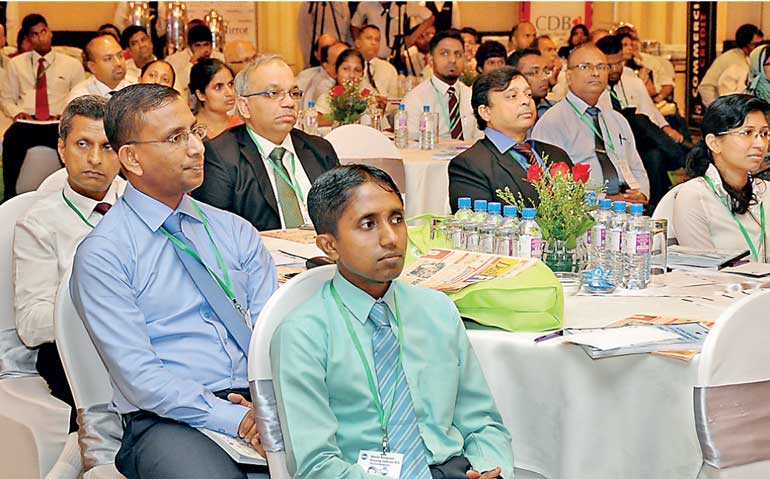
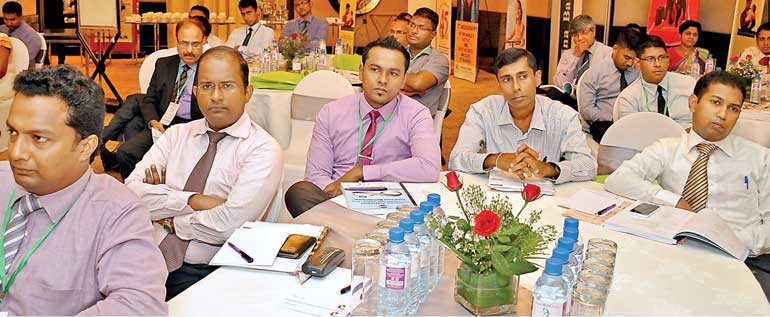
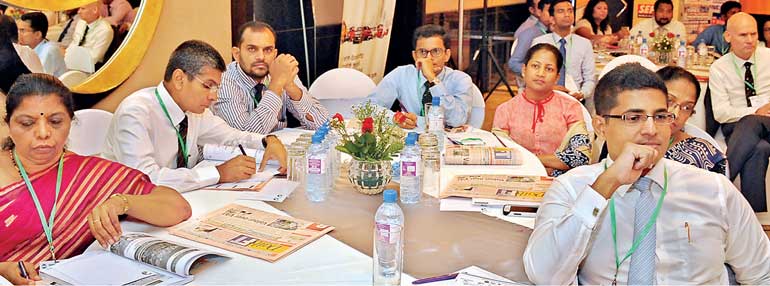
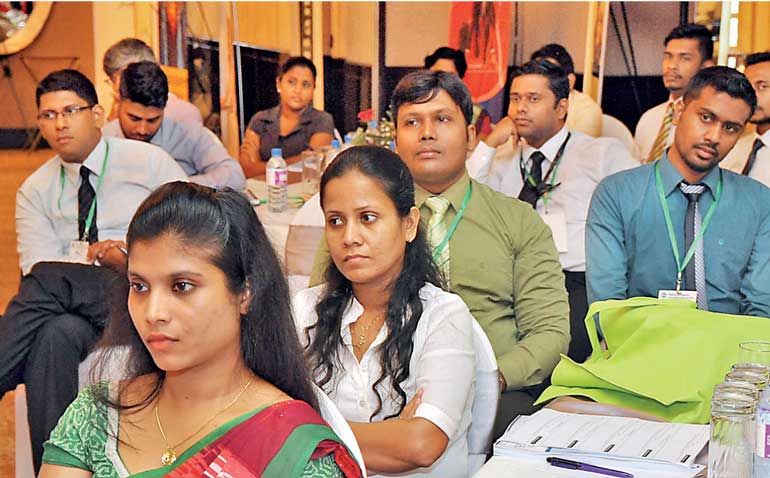
Pix by Lasantha Kumara
By Hiruni Dabarera
The second day’s opening technical session (fifth technical session) of the CMA National Management Accounting Conference 2016 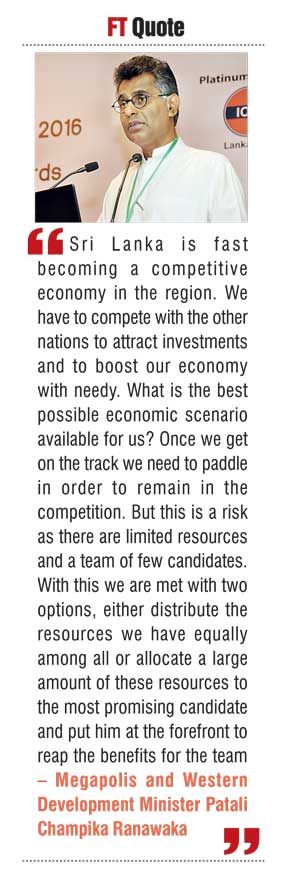 kicked off with the keynote address nu Megapolis and Western Development Minister Patali Champika Ranawaka. The first session for the day was held under the title Total Cost Management (TCM) on Infrastructure Development.
kicked off with the keynote address nu Megapolis and Western Development Minister Patali Champika Ranawaka. The first session for the day was held under the title Total Cost Management (TCM) on Infrastructure Development.
The session was also addressed by the Indian Government Leader Vishwas Udgirkar and China Merchants Holdings International Chief Business Development Officer and Advisor Jared Zerbe who spoke on Public Private Partnership (PPP) and how it is the suitable option over fully government funded projects for TCM.
Megapolis to the fore
The Minister delivered the keynote address on Megapolis and its impact on economy while maintaining TCM. He enlightened the audience on the single largest development project of the Government of Sri Lanka: Western Region Megapolis. “I am here to deliver to you what the Government has on the agenda for the professionals in the Western Megapolis,” he said.
“Sri Lanka is fast becoming a competitive economy in the region. We have to compete with the other nations to attract investments and to boost our economy with needy. What is the best possible economic scenario available for us? Once we get on the track we need to paddle in order to remain in the competition. But this is a risk as there are limited resources and a team of few candidates. With this we are met with two options, either distribute the resources we have equally among all or allocate a large amount of these resources to the most promising candidate and put him at the forefront to reap the benefits for the team,” the Minister elaborated.
According to him, if resources are distributed equally, the people will be happy but it will not give the necessary strength to play in a competitive world. But if the Government concentrates a larger percentage on one candidate and nourishes him not forgetting the bare minimums of the others, then there will be at least one candidate who will be fit to compete and gain profits for the benefit of the others. This was the core concept behind the development of Megapolis. This scenario will concentrate most of Sri Lanka’s potential in to one location, creating numerous opportunities and further invest on that rather than scatter investments across the country.
“Going ahead with this idea I am happy to state that we have been mindful of TCM’s core principles. In all these steps of the Megapolis development project, there is identification, creation, modification, and termination. For this purpose Colombo along with the whole of the western region seemed the best possible candidate. It consists of 45% of Sri Lanka’s total developed roads, water supply and energy supply systems, holds the largest concentration of population (28%), the country’s largest labour force and the largest percentage of the country’s educated population. About 42% of GDP contribution is by the Western Province and the most potential booster for growth,” the Minister pointed out.
Increasing mobility within this region is more effective and less strenuous and therefore it is strategic rather than induced migration. When taking all these factors into consideration, selection of the Colombo-centred western region to be the centre of future economic progress is justifiable and its impacts will be propagated all over the island.
The Minister further emphasised how such a development scenario would not lead to hidden costs of location but make the country 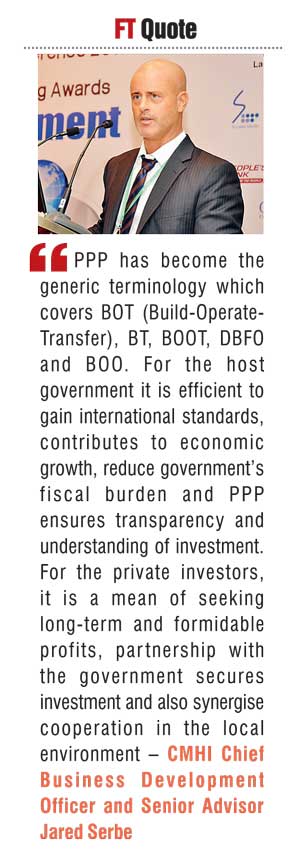 more competitive in the long run. In the second step the Ministry is in the process of accumulating strategic assets – namely land, the system of transport, environmental services, social and economic infrastructure, natural resources and the trained work force and Sri Lanka’s own intellectual capabilities.
more competitive in the long run. In the second step the Ministry is in the process of accumulating strategic assets – namely land, the system of transport, environmental services, social and economic infrastructure, natural resources and the trained work force and Sri Lanka’s own intellectual capabilities.
Management accountants are a substantial part of Sri Lanka’s talented work force. However, the Government is also mindful of the lifecycle cost of infrastructure. The Megapolis project will assess and acquire the most economically potential lands and direct them to have the most appropriate development projects. Each kilometre of expressway, high over bridge or LRT will add billions of rupees to cost burden not only for those who use them but every citizen in the country. Therefore, the Government will invest only in strategic infrastructure projects keeping natural consequences in mind by not misusing natural resources. Parallel to all this, appropriate training will be provided to the local workforce while harnessing the capabilities of local intellectuals. Western Megapolis will open doors for strategic investments in order to nourish Sri Lanka’s talents with proper foreign inputs.
“We do not need a few overtly rich businessmen in Sri Lanka, but will enable a process to facilitate a high standard of life,” Ranawaka asserted.
‘PPP – Indian Experience’
The session was then addressed by Senior Director at consulting firm Deloitte Touche Tohmatsu India Ltd., Vishwas Udgirkar, who spoke on ‘PPP – Indian Experience’. India has used PPP significantly for the last 20 years for the development of the economy. In the last few years both developed and developing countries have used the PPP approach particularly for the development of infrastructure.
“PPP is not a new concept. This was used widely in the 18th and 19th centuries, primarily by the British. In the post-World War II period, the Government took over the development of infrastructure until the ’70s when it came back into play. However, it became very popular in UK during the ’90s and it was then called Private Finance Initiative. The focus then was how to channel private investments into infrastructure and not necessarily to pass on the risks,” Udgirkar expressed.
The first Indian railway in 1853 between Mumbai and Thane was built by both private and the Government sectors. Then the British who were then in power realised how the private sector was earning huge profits through this and terminated such contracts. They realised that contracts could not be in favour of one party but had to be balanced. In the ’90s India opened almost all of its infrastructure systems for the private sector.
Some of the key benefits derived in Indian PPP space are namely DMRC setup in 1995 for the development of Delhi Metro network which helped in the removal of 3.9 lakh vehicles from the streets of Delhi, the first corridor of 65 km opened in 2002 and DMRC has been able to add 213 km of metro line and 160 stations in record time, another 159 km is under development at present. This went on to become the first-ever railway project in the world to claim carbon credits for regenerative braking and has helped to reduce pollution levels by 6.3 lakh tons every year.
PPP has also largely benefitted airport constructions in India. The Delhi airport was a result of PPP and at present it is the busiest 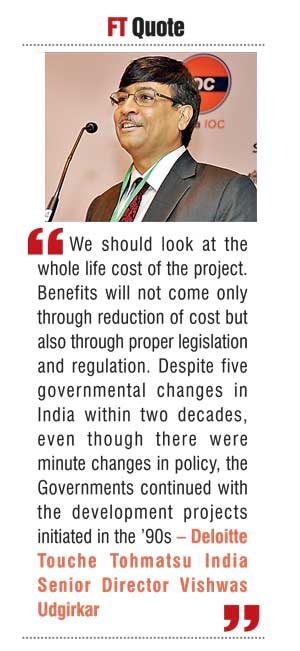 airports in India with an average of 943 airline movements a day. Through this the traffic in airlines was minimised and airports were built in appropriate locations. However, the Government still continues to hold 28% of these shares. Major airports were also reconstructed by PPP in a short period of time. Cost of air travel has significantly has gone down in India with better service at present. The public was benefitted at large and today five big airports are managed by public companies.
airports in India with an average of 943 airline movements a day. Through this the traffic in airlines was minimised and airports were built in appropriate locations. However, the Government still continues to hold 28% of these shares. Major airports were also reconstructed by PPP in a short period of time. Cost of air travel has significantly has gone down in India with better service at present. The public was benefitted at large and today five big airports are managed by public companies.
“We should look at the whole life cost of the project. Benefits will not come only through reduction of cost but also through proper legislation and regulation. Despite five governmental changes in India within two decades, even though there were minute changes in policy, the Governments continued with the development projects initiated in the ’90s,” Udgirkar further observed.
Port development through PPP
The opening session for the day was concluded by the Chief Business Development Officer and Senior Advisor of China Merchants Holdings International (CMHI), Jared Serbe. He elaborated on port development through PPP.
CMHI is China’s No. 1 port operator and the world’s third largest port operator. It is a major conglomerate based in Hong Kong involved in port operations, industrial zone development, general bulk and cargo transportation, container shipping business, air cargo, logistics park operations and paint products. It owns 55% of the Colombo Internal Container Terminal construction. Currently it has built close to 55 terminals, 25 ports in 15 countries.
“So why PPP? PPP has become the generic terminology which covers BOT (Build-Operate-Transfer), BT, BOOT, DBFO and BOO,” he noted. “For the host government it is efficient to gain international standards, contributes to economic growth, reduce government’s fiscal burden and PPP ensures transparency and understanding of investment. For the private investors, it is a mean of seeking long-term and formidable profits, partnership with the government secures investment and also synergise cooperation in the local environment,” Serbe explained.
However, there are several risks in PPP, namely political risks – changes of government, governments buy back; legal risks – change of legislation, insufficient legal framework; economic risks – change of economic markets; technical risks; corporate risks – disruption of government and private sector; and also financial risks – unexpected request from financial sector and re-financing issues.
